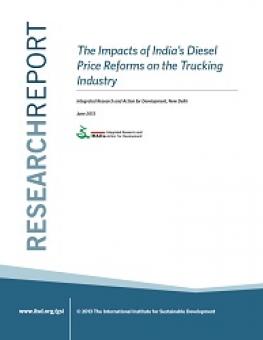
The Impacts of India's Diesel Price Reforms on the Trucking Industry
In 2011-2012, the Government of India spent over USD$15 billion subsidizing fuel products such as diesel, kerosene and liquid petroleum gas.
The government's total subsidy expenditure increased by 27 per cent from the previous year, significantly contributing to the deterioration of India's fiscal balance. In addition, national oil companies incurred over USD$10 billion worth of under-recoveries as a result of having to sell fuel at below-market prices.
In early 2012, the government initiated reforms to gradually raise the diesel price until it is aligned with market rates. This research report by the IISD's Global Subsidies Initiative (GSI) and the Delhi-based Integrated Research and Action for Development (IRADe), analyzes the vulnerability of India's trucking industry to the diesel price reforms and provides policy recommendations for minimizing the negative impacts.
You might also be interested in
Increased Support Needed to Achieve India's Clean Energy Goals
India is on track to achieve many of its 2030 clean energy goals but needs to step up government support measures to accelerate the deployment of offshore wind, electric vehicles, and green hydrogen, according to a new report.
India Faces Clean Energy Challenges as Energy Demand Soars and Global Fossil Fuel Subsidies Rise
New research finds the global energy crisis and increasing energy demand have pushed India's energy subsidies to a 9-year high.
G20 energy ministers call for cooperation on nuclear energy & low-emission hydrogen
The Group of 20 energy ministers' meeting concluded in Goa on July 22, 2023, with the final summary failing to include language on the phase-down of unabated fossil fuels.
Implementing Solar Irrigation Sustainably
This guidebook provides recommendations to state policy-makers on how they can implement solar irrigation models, particularly decentralized solar plants for irrigation under the PM-KUSUM scheme, effectively and sustainably.